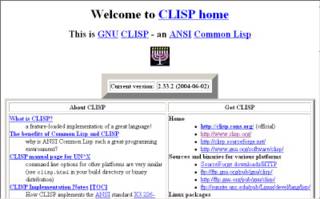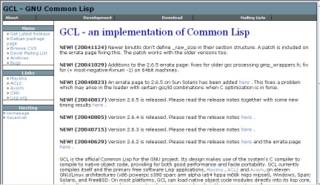LispBox
Common Lisp Resources / 資源
3.13.2006
12.08.2004
CLISP

Common Lisp is a high-level, all-purpose, object-oriented, dynamic, functional programming language.
CLISP is a Common Lisp implementation by Bruno Haible, then of Karlsruhe University, and Michael Stoll, then of Munich University, both in Germany. It supports the Lisp described in the ANSI Common Lisp standard plus many extensions.
CLISP includes an interpreter, a compiler, a debugger, a MOPish CLOS implementation, a foreign language interface and a socket interface. An X11 interface is available through CLX and Garnet. Command line editing is provided by readline.
CLISP runs on most Unix workstations (Linux, FreeBSD, NetBSD, OpenBSD, Solaris, Tru64, HP-UX, BeOS, NeXTstep, IRIX, AIX and others) and on other systems (Windows NT/2000/XP, Windows 95/98/ME) and needs only 4 MB of RAM.
CLISP is Free Software and may be distributed under the terms of GNU GPL. You may distribute commercial proprietary applications compiled with CLISP, see file COPYRIGHT in the CLISP distribution.
The user interface comes in German, English, French, Spanish, Dutch and Russian, and can be changed at run time
CMUCL
CMUCL is a free implementation of the Common Lisp programming language which runs on most major Unix platforms. It mainly conforms to the ANSI Common Lisp standard. Here is a summary of its main features:
- a sophisticated native-code compiler which is capable of powerful type inferences, and generates code competitive in speed with C compilers.
- generational garbage collection and multiprocessing capability on the x86 ports.
- a foreign function interface which allows interfacing with C code and system libraries, including shared libraries on most platforms, and direct access to Unix system calls.
- support for interprocess communication and remote procedure calls.
- an implementation of CLOS, the Common Lisp Object System, which includes ultimethods and a metaobject protocol.
- a graphical source-level debugger using a Motif interface, and a code profiler.
- an interface to the X11 Window System (CLX), and a sophisticated graphical widget library (Garnet).
- programmer-extensible input and output streams.
- an Emacs-like editor implemented in Common Lisp.
- freely redistributable: free, with full source code (most of which is in the public domain) and no strings attached (and no warranty). Like the GNU/Linux and *BSD operating systems, CMUCL is maintained and improved by a team of volunteers collaborating over the Internet.
GNU Common Lisp

GCL is the official Common Lisp for the GNU project. Its design makes use of the system's C compiler to compile to native object code, providing for both good performance and facile portability. GCL currently compiles itself and the primary free software Lisp applications, Maxima , ACL2 and Axiom, on eleven GNU/Linux architectures (x86 powerpc s390 sparc arm alpha ia64 hppa m68k mips mipsel), Windows, Sparc Solaris, and FreeBSD. On most platforms, GCL can load native object code modules directly into its lisp core, where they are preserved in any custom lisp images produced via the save-system call.

